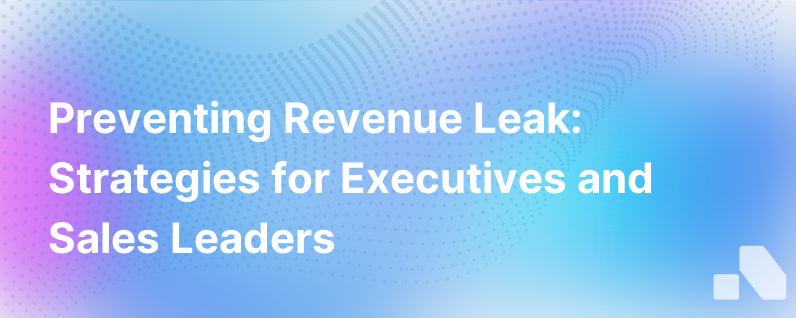
In the intricate world of B2B sales, there is a phenomenon often unnoticed yet detrimental to a company's financial health - revenue leak. It’s the gradual loss of revenue, trickling through various cracks in a business’s strategies and processes.
This leakage may be imperceptible on a day-to-day basis but can accumulate to become a raging torrent, washing away the potential for companies to achieve financial targets and thrive in the marketplace. For startups and burgeoning enterprises alike, understanding and addressing revenue leak is critical to sustaining growth and maintaining market competitiveness.
Understanding Revenue Leak
Revenue leak refers to the income a company fails to realize due to issues ranging from operational inefficiencies to customer churn. It is the difference between the potential and actual revenue gained, representing the money that quite literally ‘leaks’ out of your total earnings.
This leakage can occur at any point in the sales and marketing funnel, or service delivery, and can stem from:
- Pricing discrepancies
- Underutilized time and resources
- Contractual oversights
- Unoptimized sales processes
- Ineffective cross-sell or up-sell strategies
- Poor customer retention rates
Identifying Areas of Revenue Leakage
Before you can plug the leaks, you must locate them. This necessitates an exhaustive examination of your entire business flow. Each department, from marketing and sales to finance and customer success, plays a role. Starting from the customer acquisition phase and going through the entire lifecycle to renewal and beyond, it’s essential to scrutinize the areas where revenue could be escaping.
Let's unpack the core areas where leakage might be occurring:
Inaccurate Forecasting and Bad Data
Using inefficient data or obsolete forecasting models can lead to unrealistic sales targets. If your forecasts are not grounded in data reality, any subsequent actions will be out of sync with your market's dynamics, causing revenue to slip away unnoticed.
Poor Pricing Strategy
If your pricing strategy is not optimized, you’re essentially selling yourself short. The price point needs to be balanced delicately between what the market can bear and the value your solution provides.
Inefficient Sales Process
A sales process fraught with inefficiencies leads to unnecessarily long sales cycles, bandwidth wastage, and missed opportunities to close deals or up-sell.
Customer Churn
Losing customer trust or failing to deliver ongoing value increases churn, wiping out the hard work put into acquiring and nurturing those relationships.
Sluggish Adoption of Technology
An unwillingness or delay in adopting modern business tools for automation, analytics, and customer relationship management will stall your productivity and response times.
How to Prevent Revenue Leak
The remedy to revenue leak lies in an intentional, targeted approach, both at the organizational and operational levels. Here’s how you can safeguard your revenue:
Enhanced Data Accuracy
Develop a culture of data accuracy and actionable insights. Properly implemented CRM systems like Salesforce or HubSpot, optimized with predictive analytics, provide real-time insights for better forecasting and decision-making.
Streamline Sales Processes
Revisit and refine your sales process regularly. Providing your sales team with AI-driven tools like Aomni can expedite research, lead qualification, and personalize sales efforts, reducing the chances of leakages bred by inefficiencies.
Optimize Pricing Strategies
Ensure your pricing model accurately represents the value offered. Using dynamic pricing tools and competitive analysis can help adjust your pricing to market conditions while maximizing value.
Fortify Customer Relationships
Focus on improving customer experience and maximizing lifetime customer value. Implementing customer success initiatives and loyalty programs can reduce churn rates and encourage renewals.
Adopt Technology and Automation
Embrace automation technology for routine and repetitive tasks. This not only cuts down on time and potential human error but also allows your team to focus on high-touch, high-impact activities that generate revenue.
Improve Training and Development
Invest in continuous training and enablement of your workforce. A skilled team is your best defense against revenue leak by ensuring efficiency and high performance across the operations.
Regular Audits and Assessments
Conduct regular audits to monitor and measure the effectiveness of your strategies. This practice can highlight existing and potential leaks for you to address timely.
Implementing a Holistic Approach
Preventing revenue leakage requires a holistic view of your business health. It’s not just about fixing immediate gaps; it’s about creating an ecosystem within your company that is resilient against revenue threats.
This ecosystem needs to be well-connected, where communication and transparency are paramount. Gathering insights from different business areas enables a broader perspective to predict where leaks might occur and how they can be preemptively sealed.
Conclusion
Plugging revenue leaks is not simply about preserving income; it’s about transforming your operations to be more efficient, proactive, and ultimately more profitable. It requires vigilance and ongoing commitment to improvement, yet the process can be simplified with the right tools at hand.
Implementing a platform like Aomni provides your teams with comprehensive support to navigate complex sales landscapes effectively. With real-time account research, competitive insights, and personalized sales content, Aomni empowers businesses to streamline their sales process and staunch potential revenue leaks before they can impact the bottom line.
Curbing revenue leak thus becomes an opportunity – a chance to refine and galvanize your growth strategies, turning potential loss into a competitive advantage in the constantly evolving B2B arena.